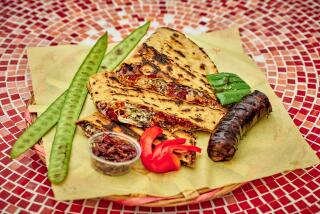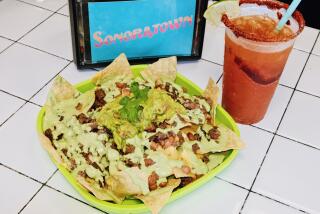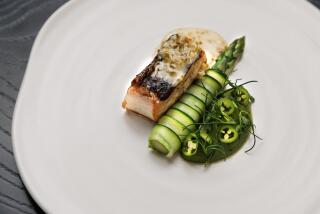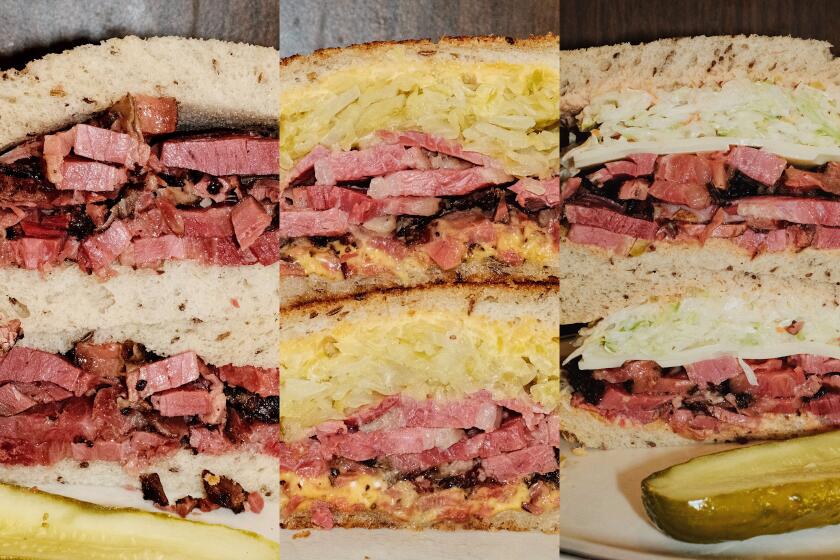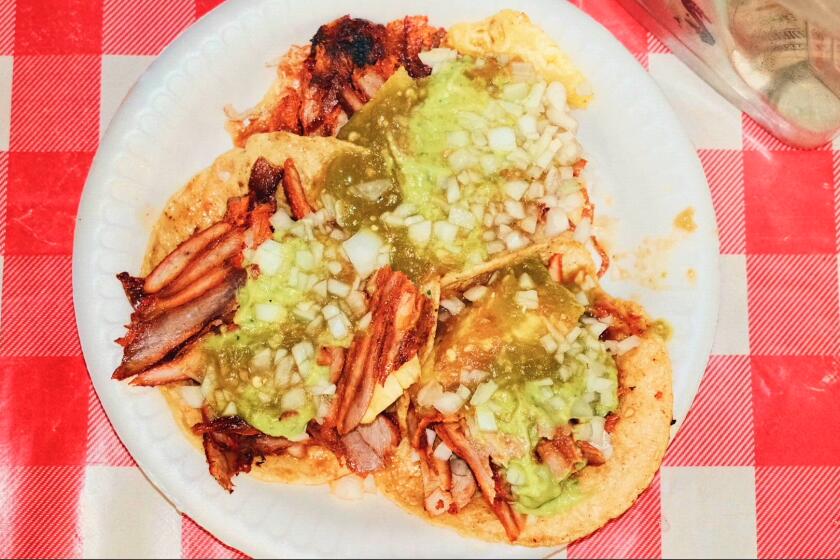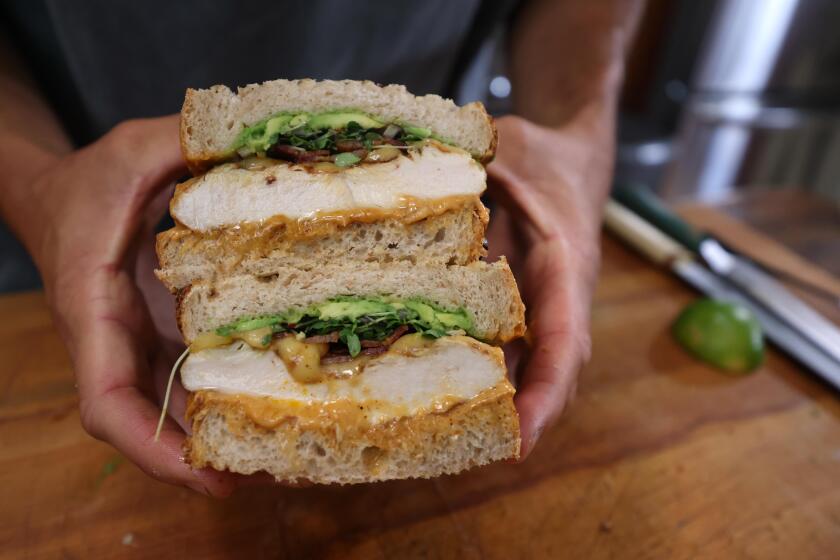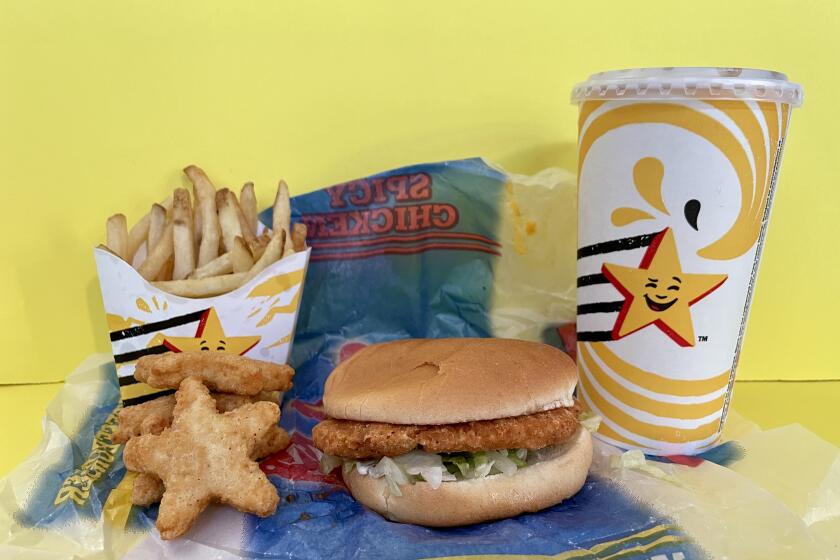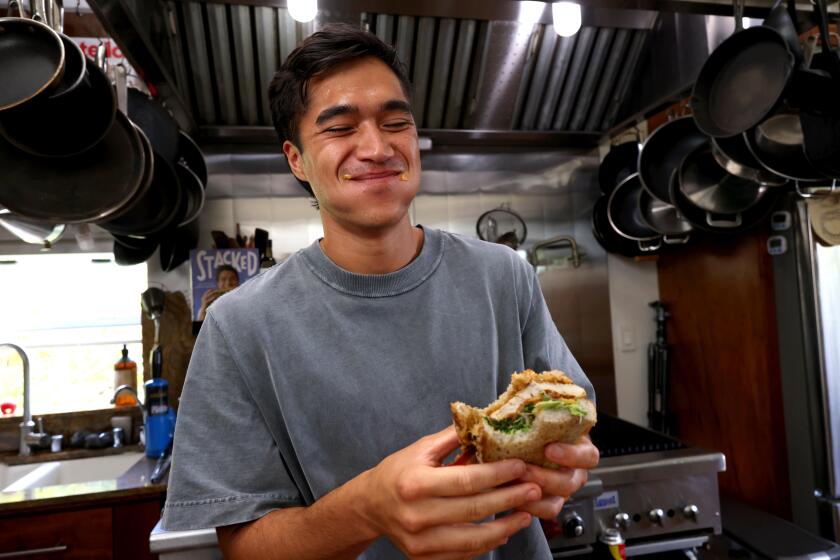Formal Italian meets friendly arts district at the Factory Kitchen
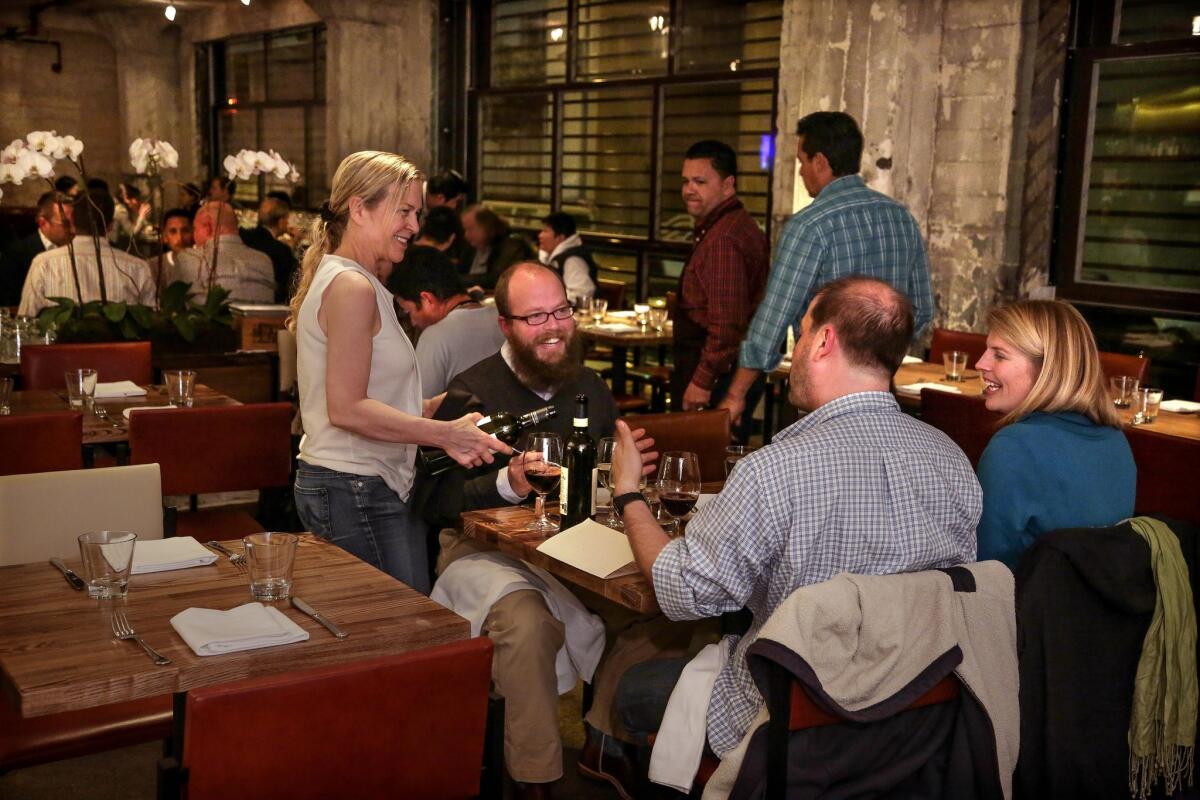
If you dine regularly in Los Angeles’ Italian restaurants, you have probably lived through the fresh-pasta wars, the head cheese skirmishes and the incursion of the massive T-bones. We have not yet quite climbed out of the charred rubble of the wood-fired pizza moment, where the mozzarella comes from buffaloes and the thermostat is always set to 800 degrees.
So you may be surprised to discover that the latest battleground may be the obscure Ligurian specialty called focaccia di Recco, a stuffed flatbread from a town 20 minutes outside Genoa. Like burrata, a cheese whose fame until recently was confined to a few square miles of central Puglia, focaccia di Recco is a food whose time has come.
When prepared correctly, as it is at the Factory Kitchen in the arts district east of downtown (and also at chiSpacca on Melrose), focaccia di Recco is a marvelous thing, oiled dough stretched thin as filo and folded around milky, tart crescenza cheese. When it is baked, the focaccia becomes crisp and translucent, almost weightless, looking closer to a well-made Lebanese borek than to anything you might think of as a calzone. (Genoa is, of course, an ancient port, and it is not unlikely that the recipe for borek would have made its way there at some point.) At the Factory Kitchen, you can also get your focaccia di Recco stuffed with ham or slicked with tomato sauce and strewn with cured anchovies, but the additions are almost beside the point. The essence of the Factory Kitchen’s focaccia di Recco is all in its ethereal crunch.
The Factory Kitchen occupies a slightly odd location, a tight room, probably a former loading dock, in an old manufacturing complex that has been converted into luxury lofts. The floors are of cracked concrete. The massive pillars betray several layers of peeling paint. The last time I was in the restaurant, a friend said the place reminded him of restaurants he’d been to in Johannesburg. I was thinking more of Barcelona, but the idea is the same — this isn’t a designer’s fantasy of a reclaimed industrial space, it is an industrial space, slightly awkward, almost willfully unchic, and the customers tend to be a few years older than the people who frequent nearby Bestia. The music tends toward Motown, and the open kitchen is as lacking in meat-curing closets as the dining room is in artfully exposed brick.
The Factory Kitchen is the first solo effort from Angelo Auriana, fresh from a couple of years at a Ligurian-style trattoria in San Francisco’s Mission District, and before that an 18-year stint as the chef at Valentino in Santa Monica, which for much of that time was regarded as the grandest Italian restaurant in town. Valentino is still regarded as perhaps the last of the great proprietor-driven Italian restaurants in America, a place where Piero Selvaggio and his captains guide their patrons, many of whom have never seen a menu, through their meals, but it was Auriana who solidified Selvaggio’s whims into solid cuisine.
Auriana’s partner is Matteo Ferdinandi, another veteran of white tablecloth Italian restaurants who most recently ran the front of the house at Drago Centro. When it was announced that the two were opening a restaurant together, most people assumed that it would be the kind of starchy place in which both of them had been trained.
But the Factory Kitchen is a compelling new hybrid — an informal trattoria with rather formal northern Italian cooking, like those restaurants you sometimes find hidden in the warehouse districts of European cities that just happen to have a Michelin star. The dishes are composed; careful. This is not country food.
So you will find rustic dishes like pancotto, usually a kind of bread-thickened soup made with leftovers, as an elegant slice of semolina crust topped with braised greens and a fried duck egg — the broth, soaked into the bread, only reveals itself when you take a bite. A soup of tiny Umbrian lentils is both earthy and elegant; steamed littlenecks are delicious, but not quite as delicious as their garlicky chickpea broth. You may have seen something like Auriana’s peperu, tiny cheese-stuffed cherry peppers, as a passed hors d’oeuvre, but the sweet pickled chiles have both heat and a subtle crunch. Even the frittura, a mass of fried baby leeks, have the presence of decent tempura, and the fries with which they are tossed turn out to be made from mashed chickpeas instead of potatoes, like the Ligurian version of Provencal panisses.
Farina, Auriana’s San Francisco Ligurian restaurant, was famous for its mandilli, delicate handkerchief pasta, served as sheets crumpled over a pesto thickened with almonds instead of pine nuts. Mandilli is also probably the best pasta at Factory Kitchen, fragrant and thin as fine silk, almost too fragile to pick up with a fork. There are casonzei, the specialty of Auriana’s hometown of Bergamo, thin pasta stuffed with pork, cured pork and veal, served simply with browned butter and sage; and quadretti, tiny ravioli filled with smoked ricotta and tossed with braised octopus.
The menu changes daily, but you will usually find a porchetta, one of the best versions in town, of crunchy rolled pork belly flavored sharply with fennel pollen; and a dish of duck served two ways, the breast pan-grilled rare, the leg and thigh stewed into softness. You will want to try the seared gallinella di mare, sea robin, pan-roasted with olives and cherry tomatoes, or the sea scallops with capers, raisins, and caramelized cauliflower florets.
And there’s cannoli for dessert.
The Factory Kitchen
Chef Angelo Auriana comes home, focaccia di Recco for everyone.
LOCATION
1300 Factory Place, Los Angeles, (213) 996-6000, thefactorykitchen.com.
PRICES
Antipasti $8-$12; focaccias $15-$17; pastas $18-$19; main courses $22-$26; desserts $8; corkage $20 per bottle.
DETAILS
Lunch Mon.-Fri., 11:30 a.m. to 2:30 p.m.; dinner Sun.-Mon., 5:30 p.m. to 10 p.m.; Tues.-Thurs., 5:30 p.m. to 10:30 p.m.; Fri.-Sat., 5:30 p.m. to 11 p.m. Credit cards accepted. Full bar. Valet parking.
RECOMMENDED DISHES
Recommended dishes: beet gratin; focaccia tradizionale; handkerchief pasta with almond pesto; casonzei; seared mullet with cherry tomatoes; porchetta; duck; cannoli.
More to Read
Eat your way across L.A.
Get our weekly Tasting Notes newsletter for reviews, news and more.
You may occasionally receive promotional content from the Los Angeles Times.
